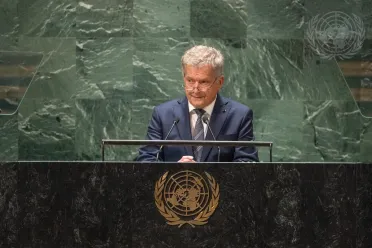Statement
Statement summary
SAULI NIINISTÖ, President of Finland, underscored the need to find solutions to the challenges facing the world and ensure that the global community is moving in the right direction. The world has grown even more complicated, with global tensions running high and competition among great Powers accelerating. Rebuilding trust and reigniting global solidarity — the theme of this year’s session — must not remain empty rhetoric, he said, noting: “we need to put these words into practice”. Various global challenges, including climate change and pandemics, cannot be solved by one country alone. Additionally, the opportunities presented by new technologies are also best harnessed together, he said, citing the multilateral system as “the best means” to the challenges faced by the international community. “As we strive to strengthen multilateral cooperation, all voices must be heard, particularly the critical ones,” he added.
Highlighting tremendous changes that brought about the rapid growth in the Global South, he said Asian, African and Latin American countries are now powerful geopolitical players, with the fastest growing and most populous economies. On the large-scale war launched by the Russian Federation against Ukraine, he expressed support for the latter’s inherent right to self-defence, adding that its fight for freedom carries echoes of his own country’s history. “We, too, have fought for our freedom and independence against enemies far greater in size and paid a high price for it,” he recalled, warning against a world in which “the big subjugates the small”. The war in Ukraine must not become one of the many protracted conflicts seen around the world today, he cautioned, adding that its territorial integrity is “in all of our interests”. Bringing the war to a just end is not only essential to Ukrainians but it may also ease tensions on a wider scale.
Turning to international arms control architecture, he said important treaties have been abandoned and “what is left seems to be in jeopardy”. In this context, rebuilding and strengthening arms control in the current international climate is difficult. However, a world without mutually agreed rules and transparency is an unpredictable one, he said, noting that emerging technologies are further complicating the picture and the risks are mounting. There are 100 ongoing conflicts worldwide and people in Afghanistan, Sudan and Yemen, inter alia, continue to face enormous humanitarian needs. “We should not lose sight of any of these emergencies,” he said, stressing the importance of prioritizing diplomacy and making full use of the United Nations. Noting that climate change is a challenge that the global community cannot escape, he underlined the need to strengthen the collective ambition to reduce emissions.

